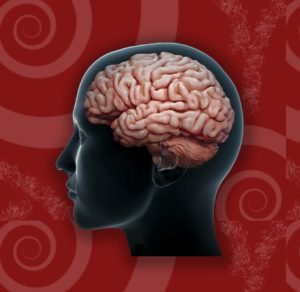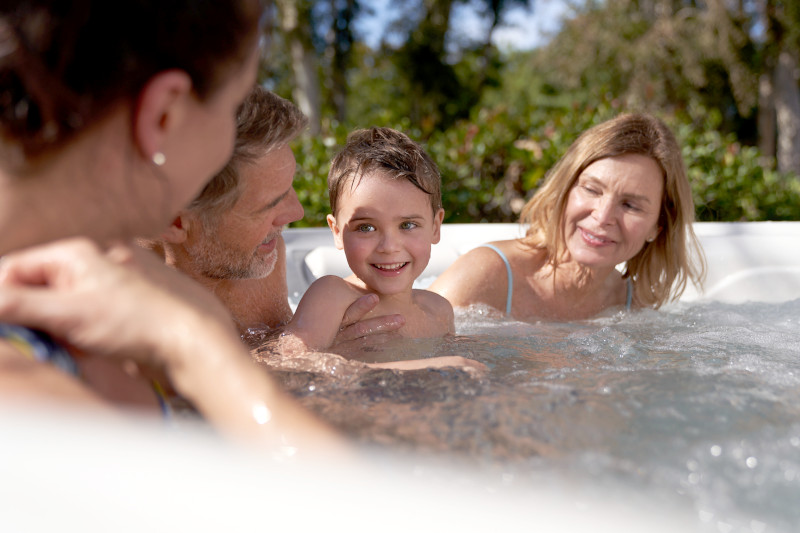Is Hot Tub Soaking Beneficial for Traumatic Brain Injury (TBI)?

Here’s from Ross: Hello Alice: I posted on poolspaforum and one of your customers suggested I pose our question to you. As I said in the post, personal opinions and experience are no substitute for professional medical advice, but we’d be interested to know if you have any insight. Thank you in advance… Ross & Joanne
You can read the entire post at poolspaforum. In it he says, “Since we do not have a tub in our house (can you believe that?) we are considering investing in a spa (likely a Hot Spring Spa). (Great choice!) We met with her neurologist last week and his response to our question about using a spa was concern about subjecting her body to excessive heat, adding that not much research has been done to determine one way or the other if this is a benefit or detriment to TBI rehabilitation. My fiance recently tried a friend’s spa one afternoon and was extremely happy with how good it made her arm feel and the overall sense of relaxation in general. In other words, SHE LOVED IT!”
I was very intrigued by Ross’ email. I knew nothing about hydrotherapy and TBI, but I knew someone who could direct me to people who did. I emailed Laurie Batter who is the publicist and marketing consultant for the National Swimming Pool Foundation’s’ World Aquatic Health Conference every year. She posed the question to Dr. Bruce Becker, the foremost authority on hot water physiology in the U.S. Dr. Becker was kind enough to reply to Ross:
Dear Ross,
I am a physician specialist in rehabilitation medicine (a psychiatrist), and past medical director of the Rehabilitation Institute of Michigan and St. Luke’s Rehab Institute in Spokane WA were I currently reside. I am presently the Director of the National Aquatics & Sports Medicine Institute, a research facility at Washington State University in Pullman, Washington. I became interested in the use of aquatics after working first with Olympians and then conventional rehab populations. It has been a passion ever since.
We have done a lot of work with hot tubs, and my previous work with TBI patients has given me a significant reason to believe that warm water immersion may indeed have real benefit for the management of brain injury.
To start with, work recently done in our lab showed that during immersion in warm water, the central nervous system undergoes a down-regulation of stress responses. That response in work done elsewhere has shown improvement in working memory, mood state, and general brain function. In some animal studies, immersion in warm water also correlates with release of a chemical called BDNF, which stands for brain-derived-neurotrophic-factor. This is an amazing protein that the body produces and which in other animal studies has proven dramatically effective in aiding nerve and brain regrowth and restoration. It also is produced during exercise.
During my years at St. Luke’s, we routinely had the TBI patients come down to the therapy pool first thing in the AM, and found that those folks showed improved speech function, less agitation, and improved sleep patterns. They required less medication through the day to control agitation. There is a lot of reason to believe that immersion improves brain blood flow. That can’t be bad. The combination of improved blood flow and decreased stress and pain responses are potentially a really significant health benefit.
So I would support your thoughts. That said, I would also suggest that normal pool-based activity would be very useful for her spine fractures and back pain. I don’t know where you live, but there may well be physical therapists who areknowledgeable in aquatic therapy in your area. I’d be happy to chase this for you if you need so.
Ross replied:
Hello Bruce,
Very interesting insight. It is reassuring to know that our purchase could indeed have a dual purpose…simple relaxation AND potential benefits to Joanne’s future recovery. Joanne is showing great potential for continued progress in her quest for better short-term memory and cognitive skills and it would seem that the spa will also contribute to that rehab. As you noted, a spa in the AM might serve to be a great jump start to the brain…and another session at night (in my opinion) could be a great way to minimize her muscle spasms without the need for medication.
In closing, I must tell you how appreciative we are in your willingness to jump in and offer your perspective. It is very encouraging to read your email and I can’t wait for Joanne’s return home to begin with our new ideas. Thank you so much for sharing your time and advice.
Sincerely,
Ross & Joanne
North Sandwich, NH
Dr. Becker shared one additional insight in an emailed reply:
Ross,
There is a lot of misinformation about TBI recovery times. While the first months are pretty rapid generally, I was taught that what you see at 18 months is what you get. I still see patients who are told that. My experience showed that to be entirely inaccurate. I followed my TBI folks for many years, and saw continued improvement especially in those folks who were active and regular exercisers. So the trick is to keep moving, keep up the effort, and don’t lose hope. While the trudge forward is frustratingly slow at times, with periods when it seems like nothing is happening, then there are usually periods of pretty rapid improvement.
My very best wishes to you and Joanne.
Bruce
Read more on TBI on the National Institute of Neurological Disorders and Stroke website. And on the Brainline.org website a group dedicated to helping people live with TBI. On their website they note that: “7 million people sustain a TBI each year in the United States-an astounding number. By the numbers, every American has more than a 1:300 chance of sustaining a traumatic brain injury each year. The three groups at highest risk for traumatic brain injury are children (0-4 year olds), teenagers (15-19 year olds), and adults (65 and older). Estimates peg the number of sports-related traumatic brain injuries as high as 3.8 million per year. ”
If you know anyone with TBI, please share this information with them. Send in your questions. And, stay tuned for the results of more research on the physiological effects of hot water immersion, i.e. hot tubbing from Dr. Becker at the National Aquatics and Sports Medicine Institute.
SANUM PER AQUA. Latin for Health through Water.
Thanks for reading Hot Tub Bliss. We hope you went from “Ahhhh” to “A-Ha”! Be sure to ‘Like’ our Facebook Page and follow Olympic Hot Tub Company and Hot Tub Bliss on Twitter.






